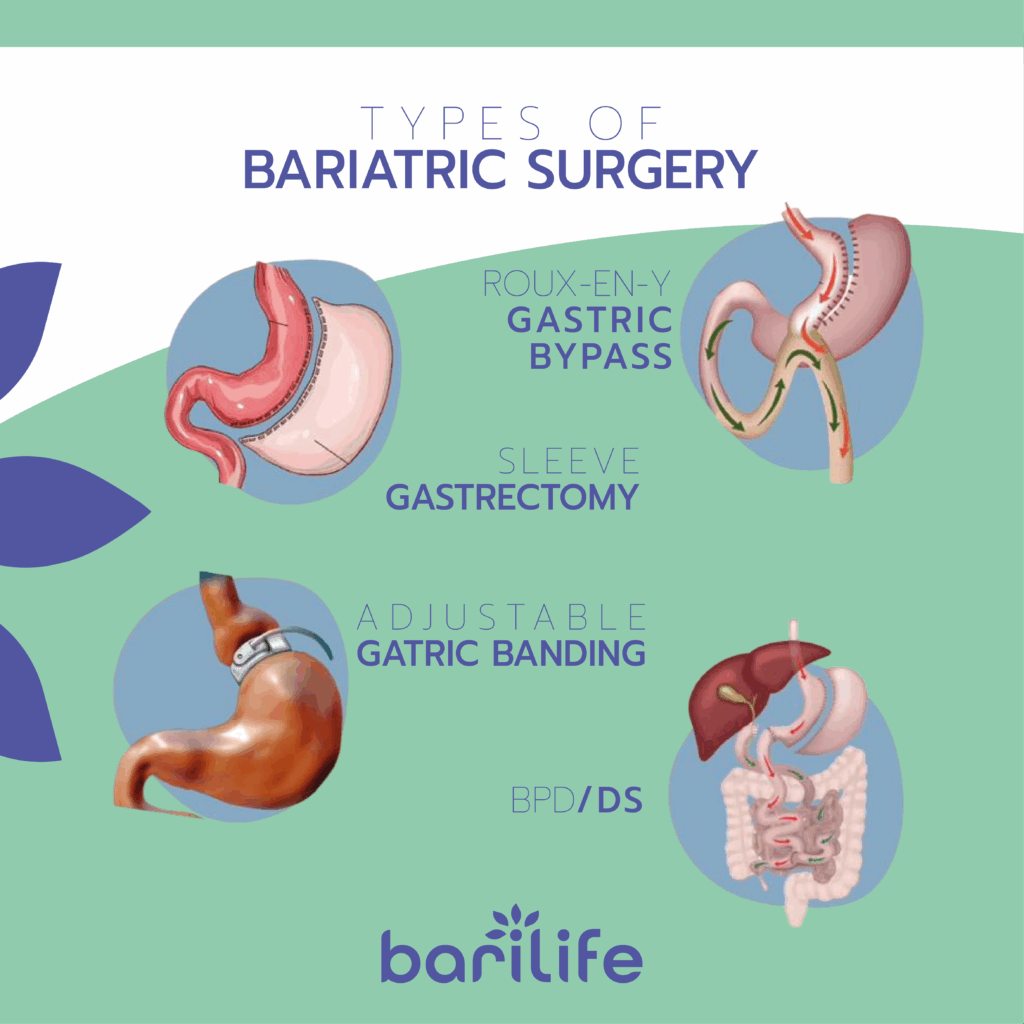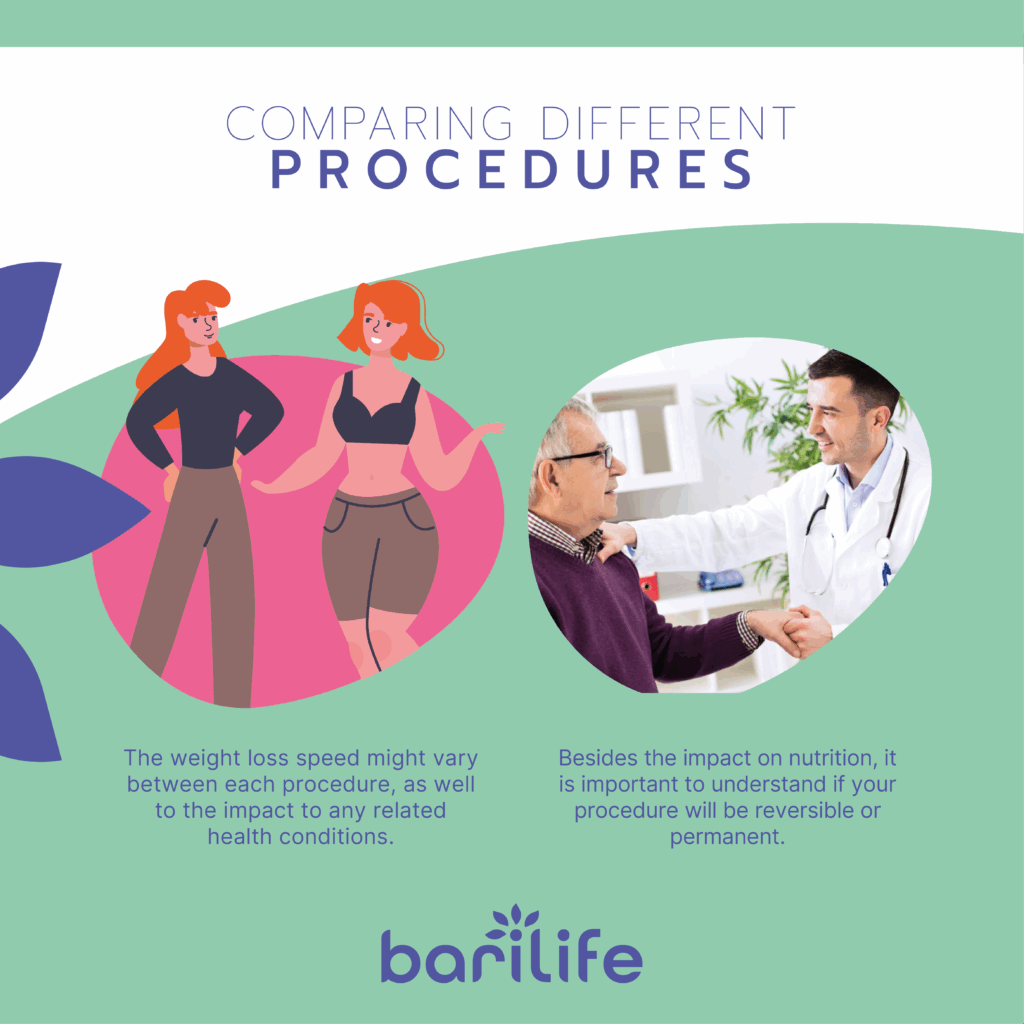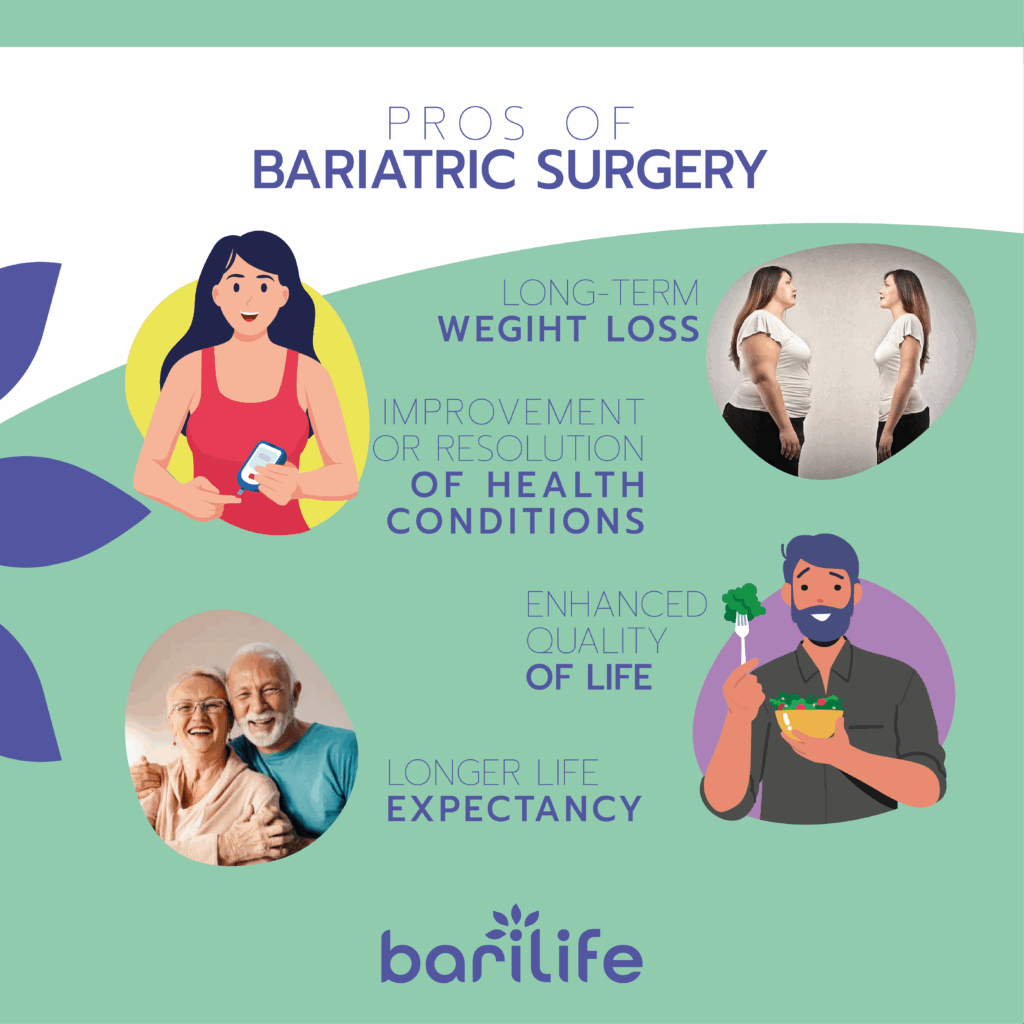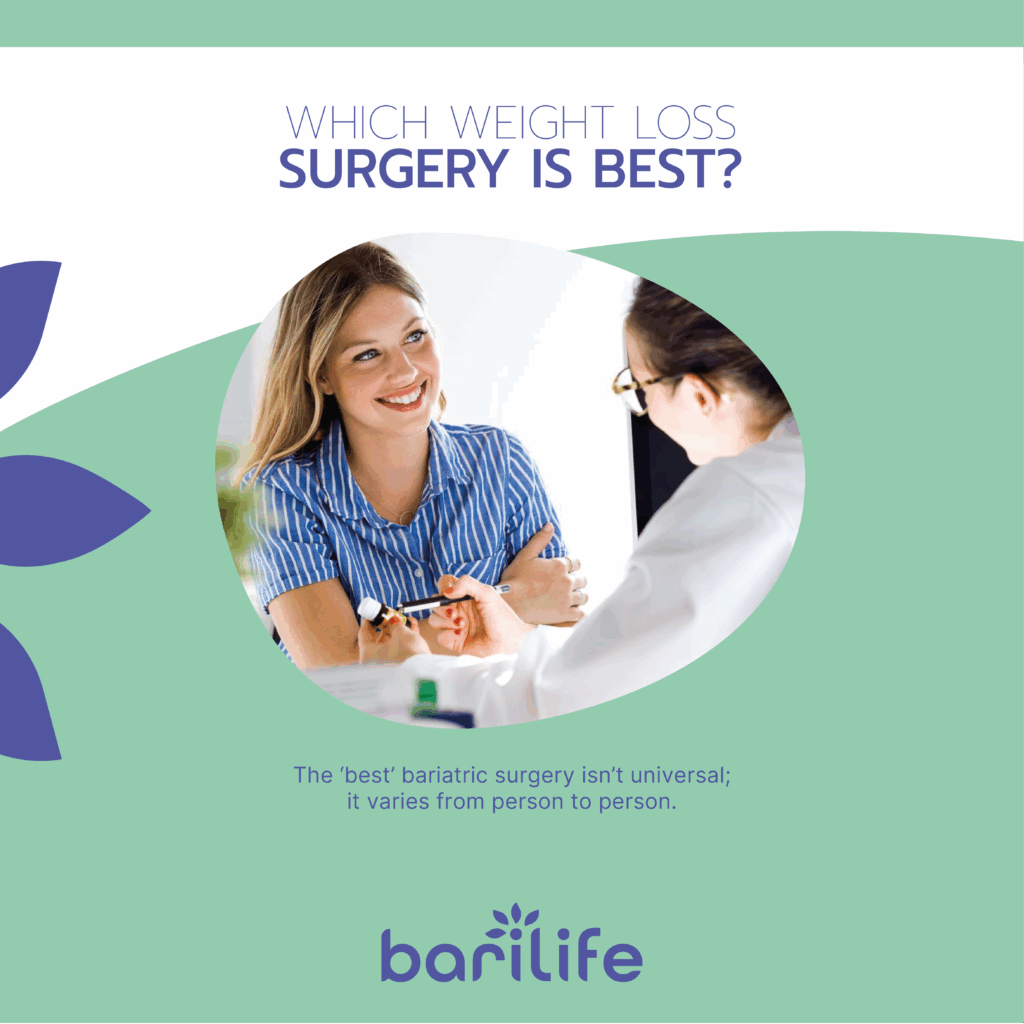Key Takeaways:
- Bariatric surgery can result in major weight loss and improvement in obesity-related health conditions.
- Different procedures have varying levels of weight loss results, risks, and lifestyle adjustments.
- Understanding both the benefits and drawbacks of each surgery type is crucial for making an informed decision.
Bariatric surgery is a transformative procedure that warrants careful thought. Various procedures are available, each with its own pros and cons, so it's important to understand what you're signing up for before making your choice.
This article will guide you through important information you need to make an informed decision about weight loss surgery, including bariatric treatment options, risks like bariatric surgery side effects, and proper bariatric wound care.
[/box]
What is Bariatric Surgery?

Bariatric surgery pertains to a group of surgical procedures designed to help people with severe obesity lose weight. Unlike diets or exercise programs that might help you lose a few pounds, bariatric surgery changes how your digestive system works.
These procedures work in different ways. Some make your stomach smaller, so you feel full after eating less food. Others change how food moves through your digestive system, reducing the calories and nutrients your body absorbs. Many surgeries also affect hormones in your gut that control hunger, helping you feel less hungry and more satisfied after meals.
Doctors typically recommend bariatric surgery for individuals with:
- A body mass index of 40 or more
- A BMI between 35 and 39.9 who have severe weight-related health issues such as high blood pressure, type 2 diabetes, or severe sleep apnea
- Unsuccessful attempts at losing weight through other methods
It's important to understand that bariatric surgery isn't a quick fix or an easy way out. It's a tool that, when combined with lifestyle changes, can help achieve significant weight loss for people who haven't found success with diet and exercise alone.
Types of Bariatric Surgery
There are several different bariatric surgery types, with pros and cons varying with each procedure. Here are the most common options:
Roux-en-Y Gastric Bypass (RYGB)
This procedure involves two main steps. First, your surgeon creates a small pouch from the upper part of your stomach, making it much smaller than before. Then, they connect this pouch directly to the middle part of your small intestine, bypassing the remaining part of your stomach and the first section of your small intestine.
This dual approach means you eat less food and absorb fewer calories and nutrients from the food you do eat. RYGB also changes gut hormones, reducing hunger and helping control blood sugar. While highly effective, the procedure results in bariatric surgery incisions that require careful aftercare to minimize healing issues and potential bariatric surgery scars.

Sleeve Gastrectomy
During this procedure, surgeons remove about 80% of your stomach, leaving a banana-shaped "sleeve" or tube. This smaller stomach holds less food, helping you feel full sooner. Like gastric bypass, sleeve gastrectomy also affects hunger hormones, typically reducing your appetite.
It has become one of the most popular bariatric procedures because it's relatively simple compared to some other options and doesn't involve rerouting the intestines.
Adjustable Gastric Banding
This procedure involves placing an inflatable band at the upper portion of your stomach, creating a small pouch on top of the band with the rest of your stomach below. The band has a balloon inside that can be modified by adding or removing saline solution using a port placed under your skin.
By adjusting the band's tightness, your doctor can change how quickly food passes from the upper pouch to the lower part of your stomach, helping control how much you eat.
Biliopancreatic Diversion with Duodenal Switch (BPD/DS)
This complex procedure combines aspects of sleeve gastrectomy and gastric bypass. First, the surgeon performs a sleeve gastrectomy, which reduces stomach size. Then, a large portion of the small intestine is bypassed, significantly limiting how many calories and nutrients your body can absorb.
While this procedure often leads to the most dramatic weight loss, it also carries higher risks of nutritional deficiencies and complications.
Comparing Different Procedures
When considering the pros and cons of bariatric surgery, it's helpful to compare how different procedures stack up against each other:
Weight Loss Results
If looking purely at pounds lost, BPD/DS typically leads to the most weight loss (often 60-70% of excess weight), followed by gastric bypass (50-60%), sleeve gastrectomy (50-55%), and adjustable gastric banding (40-50%). However, individual results vary widely.
Surgical Complexity and Recovery

Adjustable gastric banding is generally the least invasive, with shorter hospital stays and recovery times. Sleeve gastrectomy is moderately complex, while gastric bypass and BPD/DS are more complex procedures with longer recovery periods.
Impact on Nutrition
Procedures that bypass portions of the intestine (like gastric bypass and BPD/DS) lead to more significant nutritional concerns because they reduce your body's ability to absorb nutrients. Sleeve gastrectomy and adjustable gastric banding have less impact on nutrient absorption but still require dietary changes.
Reversibility
Adjustable gastric banding is the only procedure that's relatively easily reversible. The other procedures are considered permanent, though in some cases, surgical revision is possible.
Effect on Related Health Conditions
Gastric bypass and BPD/DS often show the most dramatic improvements in conditions like type 2 diabetes, often within days of surgery and before significant weight loss occurs. Sleeve gastrectomy also shows good results for many health conditions.
Pros of Bariatric Surgery
When considering the pros and cons of bariatric surgery, here are the significant benefits to consider:
Significant, Long-term Weight Loss
Studies show that bariatric surgery leads to greater and more sustained weight loss than non-surgical approaches for people with severe obesity. Many people lose 60-80% of their excess weight within the first year and maintain much of this loss long-term.
Improvement or Resolution of Health Conditions
One of the most impressive benefits is how weight loss surgery can improve or even reverse many serious health problems, including:
- Type 2 diabetes
- High blood pressure
- Heart disease
- Sleep apnea
- Joint pain
- Fatty liver disease
- Polycystic ovary syndrome (PCOS)
- Certain types of cancer
Enhanced Quality of Life
Beyond medical benefits, bariatric surgery often improves overall quality of life by:
- Increasing mobility and physical comfort
- Reducing pain
- Improving self-esteem and body image
- Reducing depression and anxiety
- Enhancing social interactions
- Expanding job opportunities

Longer Life Expectancy
Research suggests that for people with severe obesity, especially those with related health conditions, bariatric surgery may increase life expectancy by reducing the risk of life-threatening health problems.
Cons of Bariatric Surgery
Despite the many benefits, there are also important disadvantages of bariatric surgery to consider:
Surgical Risks
As with any major procedure, bariatric surgery carries risks such as:
- Infection
- Excessive bleeding
- Blood clots
- Breathing problems
- Reactions to anesthesia
- Leaks in your gastrointestinal system
- Death (though the risk is low, less than 1% for most procedures)
Specific Complications
Each type of bariatric surgery has its potential complications:
- Gastric bypass: Dumping syndrome (food moving too quickly through your intestines), stomal stenosis (narrowing of the connection between stomach and intestine), internal hernias
- Sleeve gastrectomy: Heartburn or leaks from the staple line
- Adjustable gastric banding: Band slippage or erosion, or port problems
- BPD/DS: Severe nutritional deficiencies, protein malnutrition, diarrhea, and intestinal issues
Nutritional Deficiencies
After some procedures (especially gastric bypass and BPD/DS), your body may not absorb enough nutrients, leading to deficiencies in:
- Iron
- Calcium
- Vitamin B12
- Vitamin D
- Other vitamins and minerals
This is one of the serious cons of bariatric surgery that requires lifelong vitamin and mineral supplementation and regular blood tests.
Lifestyle Changes
Success after surgery requires significant, permanent lifestyle changes:
- Eating very small meals (usually 1/4 to 1 cup of food)
- Chewing food thoroughly and eating slowly
- Avoiding high-sugar, high-fat foods
- Taking daily supplements
- Exercising regularly
- Attending follow-up appointments
Psychological Challenges
Some people experience psychological challenges after surgery, including:
- Depression related to lifestyle changes
- Relationship changes as your appearance and habits change
- Transfer addiction (replacing food with another substance or behavior)
- Body image issues, including dissatisfaction with excess skin after weight loss
Which Weight Loss Surgery Is Best?

The "best" bariatric procedure varies from person to person. When considering the pros and cons of bariatric weight loss surgery, what works well for someone else might not be right for you. Here's how to approach this decision:
Individual Factors to Consider
- Your current BMI and weight loss goals
- Your health conditions (some procedures work better for diabetes, others for reflux)
- Your eating habits and preferences
- Your willingness to follow strict post-surgery guidelines
- Your comfort with surgical risk
- Whether you've had previous abdominal surgeries
- Your insurance coverage
Consulting With Professionals
If you're considering bariatric surgery, first speak with a qualified surgeon who can walk you through the various procedures and their effects on your body.
Your primary care doctor should be involved, as they understand your medical history and overall health needs. Working with a dietitian will help you make the necessary dietary adjustments before and after surgery, while a mental health professional can assess
whether you're emotionally prepared for this life-changing journey. Additionally, connecting with others who have undergone bariatric surgery provides valuable firsthand insights that medical professionals alone cannot offer.
Conclusion
Bariatric surgery can be transformative, but it's not a decision to be taken lightly. The pros and cons of sleeve bariatric surgery and other procedures must be carefully weighed against your personal health needs, lifestyle, and goals.
Take time researching, asking questions, and consulting with healthcare professionals to make an informed decision. With the right approach, bariatric surgery can be the beginning of a h

Leave a Comment
Your email address will not be published.